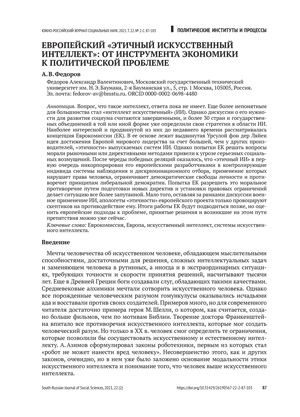Аннотация
Вопрос, что такое интеллект, ответа пока не имеет. Еще более непонятным для большинства стал «интеллект искусственный» (ИИ). Однако дискуссии о его нужности для развития социума считаются завершенными, и более 30 стран и государственных объединений в той или иной форме уже определили свои стратегии в области ИИ. Наиболее интересной и продвинутой из них до недавнего времени рассматривалась концепция Еврокомиссии (ЕК). В ее основе лежит выдвинутая Урсулой фон дер Ляйен идея достижения Европой мирового лидерства за счет большей, чем у других производителей, «этичности» выпускаемых систем ИИ. Однако попытки ЕК решать вопросы морали рыночными или директивными методами привели к угрозе серьезных социальных возмущений. После череды победных реляций оказалось, что «этичный ИИ» в первую очередь инкорпорирован его европейскими разработчиками в контролирующие индивида системы наблюдения и дискриминационного отбора, применение которых нарушает права человека, ограничивает демократические свободы личности и противоречит принципам либеральной демократии. Попытка ЕК разрешить это моральное противоречие путем подготовки новых директив и установки правовых ограничений делает ситуацию все более запутанной. Мало того, оставляя за рамками дискуссии военное применение ИИ, апологеты «этичности» европейского проекта только провоцируют скептиков на противодействие ему. Итоги работы ЕК будут подводиться позже, но оценить европейские подходы к проблеме, принятые решения и возникшие на этом пути препятствия можно уже сейчас.
Ключевые слова
Библиографические ссылки
Автоматический «Большой брат». ЕС призвали запретить применение искусственного интеллекта для распознавания лиц (2021, Июнь). BBC News. Режим доступа https://www.bbc.com/russian/news‑57559528
Могирини назвала проекты, которые профинансирует оборонный фонд Евросоюза (2019, Февраль). РИА Новости. Режим доступа https://ria.ru/20190215/1550954278.html
Папа Римский: «ИИ может ввергнуть мир в варварство» (2019, Октябрь). Хайтек+. Режим доступа https://hightech.plus/2019/10/01/papa-rimskii-ii-mozhet-vvergnut-mir-v-varvarstvo
Попсулин, C. (2013). США визуализируют работу человеческого мозга. CNews. Retrieved from https://www.cnews.ru/news/top/ssha_vizualiziruyut_rabotu_chelovecheskogo
Послание Генерального секретаря на совещании Группы правительственных экспертов по новым технологиям в области автономных систем оружия летального действия (2019). Режим доступа https://www.un.org/sg/en/content/sg/statement/2019–03–25/secretary-generals-message-meeting-of-the-group-of-governmental-experts-emerging-technologies-the-area-of-lethal-autonomous-weapons-systems
Федоров, А.В., Цыгичко, В.Н. (ред.) (2001). Информационные вызовы национальной и международной безопасности. Москва: ПИР-Центр.
Федоров, А.В. (2020). «Этичный искусственный интеллект» становится инструментом политики. Индекс Безопасности, 3. Режим доступа http://pircenter.org/articles/2211-8024600
A Definition of Artificial Intelligence: Main Capabilities and Scientific Disciplines (2019). Retrieved from https://ec.europa.eu/digital-single-market/en/news/ethics-guidelines-trustworthy-ai
AI HLEG. Policy and Investment Recommendations for Trustworthy Artificial Intelligence. (2019). Retrieved from https://ec.europa.eu/digital-single-market/en/news/policy-and-investment-recommendations-trustworthy-artificial-intelligence
Artificial Intelligence: The Commission takes forward its Work on Ethics Guidelines (2019). Retrieved from https://ec.europa.eu/commission/presscorner/detail/en/IP_19_1893
Artificial Intelligence: The Commission Welcomes the Opportunities Offered by the Final Assessment List for Trustworthy AI (ALTAI) (2020). Retrieved from https://ec.europa.eu/digital-single-market/en/news/artificial-intelligence-commission-welcomes-opportunities-offered-final-assessment-list
Artificial Intelligence: The Commission Welcomes the Opportunities Offered by the Final Assessment List for Trustworthy AI (ALTAI) (2020). Retrieved from https://digital-strategy.ec.europa.eu/en/news/artificial-intelligence-commission-welcomes-opportunities-offered-final-assessment-list-trustworthy
Beijing AI Principles (2020). Beijing Academy of Artificial Intelligence. BAAI. Retrieved from https://www.baai.ac.cn/news/beijing-ai-principles-en.html
Coeckelbergh, M. (2020). AI Ethics. Cambridge MA: MIT Press.
Defense Industry: The Commission kick-starts the European Defence Fund with €1.2 Billion and Awards 26 New Industrial Cooperation Projects for More than €158 Million (2021). Retrieved from https://ec.europa.eu/commission/presscorner/detail/en/IP_21_3325
Dutton, T. (2018). An Overview of National AI Strategies. Medium. Retrieved from https://medium.com/politics-ai/an-overview-of-national-ai-strategies‑2a70ec6edfd
EDPB & EDPS Call for Ban on Use of AI in Publicly Accessible Spaces, and Some Other Uses of AI (2021). Retrieved from https://edps.europa.eu/press-publications/press-news/press-releases/2021/edpb-edps-call-ban-use-ai-automated-recognition_en
Ethics Guidelines for Trustworthy AI (2019). Retrieved from https://ec.europa.eu/digital-single-market/en/news/ethics-guidelines-trustworthy-ai
EU Member States Sign up to Cooperate on Artificial Intelligence (2018). Retrieved from https://ec.europa.eu/digital-single-market/en/news/eu-member-states-sign-cooperate-artificial-intelligence
First International Symposium on Roboethics (2004). Retrieved from http://www.roboethics.org/sanremo2004/
G‑20 Ministerial Statement on Trade and Digital Economy (2019). Retrieved from https://www.mofa.go.jp/files/000486596.pdf.
Griffin, M. (2019). Pentagon R&D Boss: The Challenge of Tur time. Defense News. Retrieved from https://www.defensenews.com/outlook/2019/12/02/pentagon-rd-boss-the-challenge-of-our-time/
Johnson, J. (2019). Artificial Intelligence & Future Warfare: Implications for International Security. Defense & Security Analysis, 35(2), 147–169.
Johnson, J. (2020). Artificial Intelligence: A Threat to Strategic Stability. Strategic Studies Quarterly, 14(1), 16–39.
Johnson, S. (2020 April). Artificial Intelligence, Drone Swarming and Escalation Risks in Future Warfare. RUSI Journal, 165(2). Retrieved from https://rusi.org/explore-our-research/publications/rusi-journal/artificial-intelligence-drone-swarming-and-escalation-risks-future-warfare
Leenes, R. (2021). AI Ethics by Mark Coeckelbergh. Prometheus, 37(1). Retrieved from https://www.jstor.org/stable/10.13169/prometheus.37.1.0069
MacCarthy, Mark, Propp, Kenneth “Machines Learn that Brussels Writes the Rules: The EU’s New AI Regulation” (2021). Retrieved from https://www.brookings.edu/blog/techtank/2021/05/04/machines-learn-that-brussels-writes-the-rules-the-eus-new-ai-regulation/
Maintaining American Leadership in Artificial Intelligence (2019). Retrieved from https://federalregister.gov/documents/02/14/2019-02544/maintaining-american-leadership-in-artificial-intelligence
OECD Legal Instruments (2019). Retrieved from https://Legal Instruments.oecd.org/en/instruments/OECD-LEGAL‑0449
Parly, F. (2019). France’s Armed Forces Minister: How AI Figures into Operational Superiority. Defense News. Retrieved from https://www.defensenews.com/outlook/2019/12/02/frances-armed-forces-minister-how-ai-figures-into-operational-superiority/
Proposal for a Regulation of the European Parliament and of the Council Laying Down Harmonized Rules on Artificial Intelligence (Artificial Intelligence Act) and Amending Certain Union Legislative Acts (2021). European Commission. Retrieved from https://eur-lex.europa.eu/legal-content/EN/TXT/?qid=1623335154975&uri=CELEX%3A52021PC0206
RB New Commission President Promises Legislation for Ethical AI (2019). Medium. Retrieved from https://medium.com/@fourthquadrant/new-commission-president-promises-legislation-for-ethical-ai‑3fa73cfc5d43
Research Priorities for Robust and Beneficial Artificial Intelligence. Open Letter (without a Date). Retrieved from https://futureoflife.org/ai-open-letter
Roberts, P. (2019). “AI for Peace”. Retrieved from https://www.rand.org/blog/2019/12/ai-for-peace.html
Secretary-General’s Message to Meeting of the Group of Governmental Experts on Emerging Technologies in the Area of Lethal Autonomous Weapons Systems (2019). United Nations. Retrieved from https://www.un.org/sg/en/content/sg/statement/2019–03–25/secretary-generals-message-meeting-of-the-group-of-governmental-experts-emerging-technologies-the-area-of-lethal-autonomous-weapons-systems
The Higher the Risk, the Stricter the Rule’: Brussels’ New Draft Rules on Artificial Intelligence (2021). Euronews. Retrieved from https://www.euronews.com/2021/04/21/the-higher-the-risk-the-stricter-the-rule-brussels-new-draft-rules-on-artificial-intellige
Van Roy, V., Rossetti, F., Perset, K., & Galindo-Romero, L. (2021). AI Watch — National Strategies on Artificial Intelligence: A European Perspective, 2021 Edition. Publications Office of the European Union. Retrieved from https://publications.jrc.ec.europa.eu/repository/handle/JRC122684
Von der Leyen, U. (2019). Union that Strives for More. My Agenda for Europe. Retrieved from https://ec.europa.eu/info/sites/default/files/political-guidelines-next-commission_en.pdf
Wakefield, Jane. Europe Seeks to Limit Use of AI in Society. (2021). BBC News. Retrieved from https://www.bbc.com/news/technology‑56745730
White Paper on Artificial Intelligence (2020). European Commission. Retrieved from https://ec.europa.eu/info/sites/info/files/commission-white-paper-artificial-intelligence-feb2020_en.pdf


